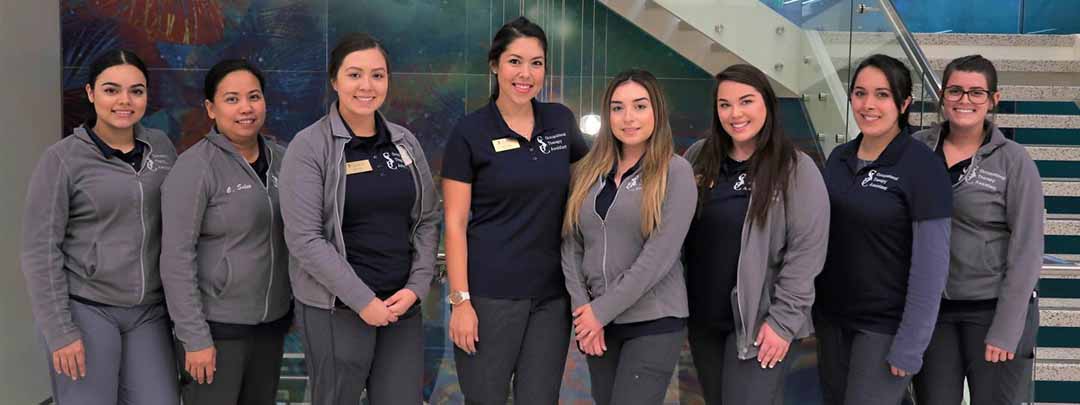OTA program accredited, celebrates first graduates amid COVID

When the accreditation agency conducted its site visit March 2-4, the San Jacinto College Occupational Therapy Assistant (OTA) Program had a lot to be thankful for. Not only did the program earn a preliminary thumbs-up, but it also squeezed in the face-to-face evaluation just before COVID-19 quarantined the U.S.
Launched in fall 2018, the OTA program at the South Campus earned its accreditation March 27, 2020, from the Accreditation Council for Occupational Therapy Education. The length of the accreditation — seven years — is the most a new program can achieve.
Sheina Farooqui, OTA core faculty, breathes a sigh of relief. Thanks to this achievement, the first cohort could graduate this spring and qualify for the certification exam.
"If the site visit had not happened in early March, we would have been in limbo," Farooqui said. "It would have affected the first class and pushed everything drastically back."
Hands-on to online
While accreditation happened on schedule, the "completely hands-on" OTA program had to adapt because of the pandemic, Farooqui said. Switching hands-on teaching to technology-driven challenged faculty members but also highlighted their communication strengths.
"That helped us get through the transition," she said. "We still had to work out the kinks and get very creative with our students — be adaptable to our students and to each other."
Hands-on took different forms during quarantine. With telehealth booming because of social distancing, OTA students simulated online treatment sessions with each other, one student acting as patient and the other as therapist during web conferencing.
Faculty demonstrated therapy techniques on themselves. Students looped in family members as "patients" during simulations. And an entire class turned on cameras to participate in a 30-minute cardiopulmonary lab together, which Farooqui dubbed a cardio workout.
"We had to make sure their learning wasn't affected because we moved online. We still needed to make them feel connected," she said.
Although the Texas Medical Center and Houston ISD clinical sites canceled, most students resumed clinical rotations at traditional hospital and outpatient settings with safety measures in place.
"This class got a lot of whammies in their program," Farooqui said. "We were so impressed. They were diligent, adaptable, and on top of their work. They didn't shrink back."
Although occupational therapy will always be hands-on, COVID-19 "ripped the Band-Aid off," showing the importance of adapting to telehealth, Farooqui said. Faculty will continue integrating technology and incorporating virtual treatment strategies into the curriculum to ensure students keep pace with the health care climate.
For now, the instructors take a moment to celebrate the program's biggest achievement: its first graduating class of eight students.
"They really demonstrated what health care professionals should be: leading tirelessly, leading with compassion, leading with integrity, and leading with selflessness," Farooqui said.
'Best health care support job'
Occupational therapy helps individuals from infants to the elderly who are struggling with physical, emotional, or other challenges. Working in settings like hospitals, pediatric clinics, nursing facilities, schools, and homes, OTAs help patients learn, recover, or improve daily living skills, or the "occupations" of life.
San Jacinto College OTA faculty members include Sheina Farooqui, OTR; academic fieldwork coordinator Christine Joseph, OTR; adjunct Vicki Thomas, COTA; and program director/department chair of health sciences Dr. Kira Beal, OTR.
The 22-month program accepts a new cohort each fall and leads to an Associate of Applied Science degree. In 2017, U.S. News Rankings listed OTAs as No. 1 in best health care support jobs and No. 12 in the 100 best jobs.
For more information, visit sanjac.edu/programs/areas-of-study/health/ota/.
They were diligent, adaptable, and on top of their work. They didn't shrink back.
Photo credit: Sheina Farooqui
